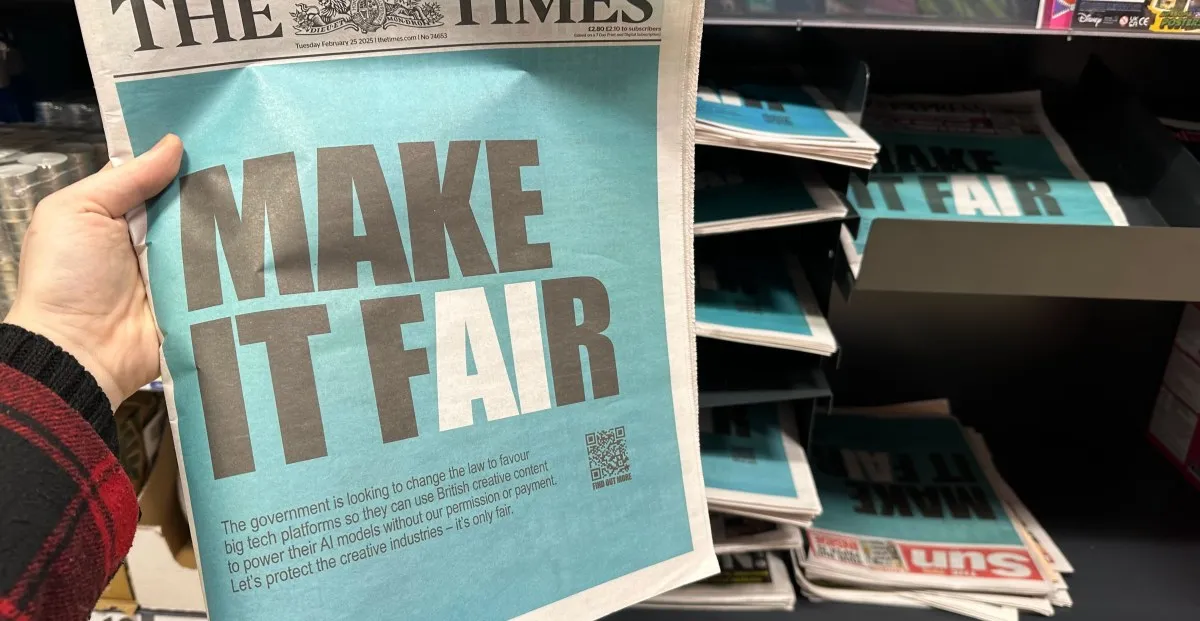
In an unprecedented show of unity, major newspapers across the UK are aligning their front pages to protest government proposals that could significantly weaken copyright protections against artificial intelligence (AI). Readers visiting their local stores today will encounter a striking display of bright blue pages with a singular demand: MAKE IT FAIR.
The Make It Fair campaign, a collaboration between creative and media industries, is urging the public to help safeguard British creative industries. This initiative aims to challenge government proposals allowing AI companies to train their models on copyright-protected material without obtaining permission.
The campaign's launch coincides with the closure of a public consultation period, which began on December 17th. This consultation invited opinions on proposed exceptions to copyright laws, potentially allowing AI training "for any purpose," including commercial use. Creatives could opt out of this new "text and data mining" process through a "rights reservation" process, but this approach places additional responsibility on individuals to protect their work.
The campaign's website, hosted by the News Media Association (NMA), highlights concerns from publishers and creators. "Tech companies use creative content, such as news articles, books, music, film, photography, visual art, and all kinds of creative work, to train their generative AI models," it states. The lack of controls, transparency, or fair payment is seen as unfair and a threat to livelihoods.
Members of the NMA, including The Sun, Daily Mail, Daily Mirror, and the Guardian, alongside regional print and digital outlets across the UK, are supporting the Make It Fair campaign. The Creative Rights in AI Coalition, a broad group of rights holders, AI businesses, and organizations, also backs this initiative to ensure that creatives receive fair compensation under generative AI regulations.
Critics fear that the government's proposals, which could weaken copyright protections and allow AI companies to freely access data, may devastate the UK's $152 billion creative industry. In addition to the Make It Fair campaign, other protests have emerged, such as the release of a silent album titled "Is This What We Want?" by over 1,000 musicians, including Kate Bush and Damon Albarn.
Owen Meredith, CEO of the NMA, expressed strong opposition to the government's proposal, stating, "This extraordinary show of unity from the news media industry shows the time has come for the government to wake up and recognize the existential threat posed by unchecked exploitation of our creative industries."
During the consultation period, the UK government invited all interested parties to share their views and evidence on the potential economic impact of these copyright changes. Although no clear timeline exists for future actions, the government intends to use consultation responses to shape its policy on expanding AI.
Meredith emphasized the need for fair partnerships between tech firms and creatives, stating, "Tech firms need creative content and up-to-date professional journalism to power AI — if they want to use our content, they must also be willing to compensate creators fairly, just as any responsible business would."
The BBC, Britain's publicly funded media service, also voiced opposition to the proposal. Rhodri Talfan Davies, Director of Nations at the BBC, stated, "To be clear, we support the government's ambition to grow the creative and AI sectors, but we do not believe securing these goals requires changes that weaken how content is protected under the UK's Intellectual Property regime."